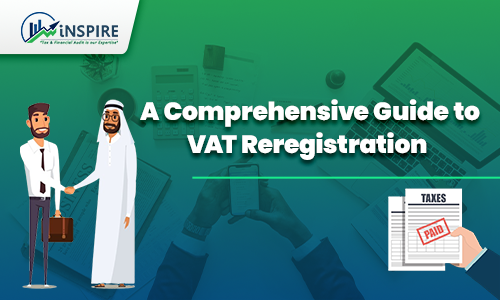
All that You Should Know About Accounting & Bookkeeping Policies in Dubai
In this comprehensive guide, we delve into the important aspects of accounting and bookkeeping policies in Dubai. From understanding the legal requirements to developing effective financial strategies, this guide is a must-read for anyone doing business in Dubai. Whether you're a small business owner or a multinational corporation, our guide offers valuable insights and practical tips to help you manage your finances and ensure compliance with local regulations. Stay ahead of the game and take control of your finances with our comprehensive guide to accounting and bookkeeping policies in Dubai.
Accounting and Bookkeeping Policies in Dubai (A Comprehensive Guide)
As one of the fastest-growing economies in the world, Dubai is a hub for businesses of all sizes and industries.
Whether you're an entrepreneur just starting out or an established company looking to expand, managing your finances is crucial to running a successful business in Dubai.
In this article, we'll take a deep dive into Dubai business accounting services on below areas:
1. What are the Must-know Accounting and Bookkeeping Policies in Dubai?
2. How to Keep Your Business Accounting Records in Order?
3. What are the Benefits of Outsourcing Your Business Accounting Services?
In Dubai, businesses must comply with the Federal Law No. 2 of 2015 on Commercial Companies (CCL). Under this law, companies must maintain accurate and up-to-date financial records and prepare annual financial statements following International Financial Reporting Standards (IFRS).
In addition, businesses must comply with the UAE VAT law, which requires companies to maintain detailed records of all transactions and file regular VAT returns.
What are the Must-know Accounting and Bookkeeping Policies?
The UAE has its own set of GAAP accounting standards. Hence, it is the responsibility of the International Federation of Accountants (IFAC) to uphold these standards. All state-owned businesses and government agencies in the UAE must adhere to GAAP principles.
To ensure compliance with these regulations, businesses in Dubai must adhere to specific accounting and bookkeeping policies. These policies include:
- Accrual Basis Accounting: Businesses must use the accrual basis of accounting, which recognizes revenue and expenses when earned or incurred, rather than when cash is received or paid.
- Double-Entry Bookkeeping: To maintain accurate financial records, businesses must use the double-entry bookkeeping system, which requires recording each transaction in at least two accounts (a debit and a credit account).
- Chart of Accounts: A chart of accounts lists a business's accounts to classify financial transactions. In Dubai, businesses must adhere to a standardized chart of accounts, which includes specific accounts for revenue, expenses, assets, liabilities, and equity.
- Financial Statements: Businesses must prepare annual financial statements, including a balance sheet, income statement, and cash flow statement, per IFRS.
- VAT Returns: Businesses operating in the UAE must abide by the Value Added Tax (VAT) regime, which went into effect on January 1st, 2018. Whether your services are domestic or international, all businesses in the UAE are subject to the new tax.
If a business meets the eligibility requirements, it must register for VAT. In Dubai, taxes can be a complicated issue. Therefore, your business needs to implement a sensible VAT Return Policy. It ought to adhere to industry standards.
How to Keep Your Business Accounting Records in Order in Dubai?
Maintaining accurate and up-to-date financial records is critical to the success of any business in Dubai. Here are some tips to keep your business accounting records in order:
- Use Accounting Software: Investing in reliable accounting software can help you streamline your accounting and bookkeeping processes, reducing the risk of errors and saving you time.
- Set Up a Chart of Accounts: Creating a chart of accounts that accurately reflects your business's financial transactions can help you keep track of your income and expenses.
- Record Transactions Regularly: Recording transactions on a daily or weekly basis can help you stay on top of your finances and ensure that you have an accurate picture of your business's financial health.
- Reconcile Bank Accounts: Regularly reconciling your bank accounts can help you identify any discrepancies or errors in your financial records and ensure that your cash balance is accurate.
- Keep Receipts and Invoices: Keeping receipts and invoices can help you verify transactions and ensure that all expenses are correctly recorded.
- Outsourcing Account Services: The transfer of accounting duties to third party accounting firms is known as accounting outsourcing. This covers tasks like financial statement preparation, tax preparation, and bookkeeping.
You can contract with an independent professional company specializing in that area to provide these services.
Outsourced accounting services take over the routine duties of your accounting department. You can decide to outsource your accounting tasks or just the busy ones. The most popular outsourced accounting services are listed below:
a) Payroll
One of the main justifications for outsourcing accounting is payroll. Payroll is challenging, and requires specialized knowledge and skills.
b) Accounts Payable
This division pays your bills. Accounts payable managers need to be very meticulous and knowledgeable about tax regulations.
c) Accounts Receivable
This division is in charge of collecting money from your clients. Your company needs agile record management if it provides its goods and services on credit. Accounts receivable management mistakes can bankrupt your company.
d) Bookkeeping
Recording your financial transactions is done through bookkeeping. Both manual and electronic methods are acceptable. Dealings with online accounting firms must be conducted electronically.
e) Budgeting
Planning your finances is the process of creating a budget. It entails calculating how much money you'll earn and how much you'll spend.
f) Tax Accounting
Creating tax returns for your company is known as tax accounting. The company will also figure out the income taxes your company must pay.
Financial accounting is distinct from tax accounting. You would be better off hiring a professional to handle these accounting duties. Due to a lack of staff, a business may outsource its accounting. Whatever the reason, it might be a less expensive option than hiring long-term employees.
What are the Benefits of Outsourcing Business Accounting Services?
Outsourcing your business accounting services can offer numerous benefits, including:
- Cost Savings: Outsourcing your accounting services can help you save on overhead costs, including salaries, benefits, and office space.
- Access to Expertise: Outsourcing your accounting services can give you access to a team of experts knowledgeable about the latest accounting and bookkeeping practices.
- Scalability: Outsourcing your accounting services can help you scale your business quickly and efficiently, without hiring additional staff.
- Increased Efficiency: Outsourcing your accounting services can help you streamline your financial processes, allowing you to focus on growing your business.
- Compliance: Outsourcing your accounting services can ensure that your business complies with all local and federal regulations, and reduce the risk of penalties.
INSPIRE provides trustworthy business support services to help your company reach its full potential. Our objective is to provide advice while letting you concentrate on your company.
You can get assistance from our team with accounting, bookkeeping, payroll, and VAT.
Contact us for more information: info@Inspiretaxconsultancy.com











